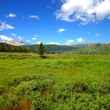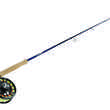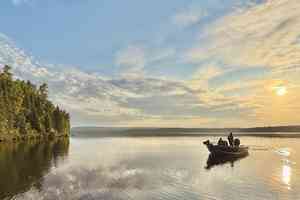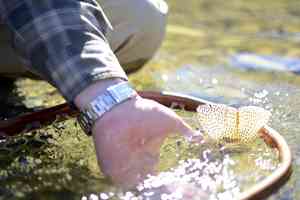I know this awesome couple out in Idaho. Bruce and Kat, like many folks in Idaho, are avid users of the great outdoors. Bruce hunts elk with a bow and fishes rattlesnake infested canyons with a fly rod. They both ride fat tire bikes up and over majestic ridge lines. In a day, Kat can cross-country ski distances that I won’t drive without a bathroom break. All on public lands that are easily accessible.
I like to think I'm pretty outdoorsy as well. I’ll backpack a dozen miles just to so I can spend a night sleeping on the ground and gazing at the stars. While my opportunities to run into a timber rattler are limited, a fat rainbow leaping from the water on the end of a fly line connects me to more than just a fish. Walking along a land trust’s trails with Ann, we marvel at how the land has been purposed and repurposed since colonial times.
Aside from athleticism and stamina, what differentiates the pursuits of Ann and I from those of Bruce and Kat is that our east coast activities are largely allowed due to the goodwill of our neighbors. A little more than 5% of Connecticut’s lands are publicly held. Private ownership closes off vast swaths of streams and forests to outdoor pursuits. And even when private landowners are inclined to open their property the patchwork of access and rules makes use difficult.
By contrast, Bruce and Kat enjoy copious amounts of landscape for their activities. Two-thirds of Idaho’s lands are in state and federal hands. According to the Outdoor Industry Association, 74% of Idahoans enjoy this bounty. Outdoor recreation in Idaho generates $6.3 billion in outdoor spending, 77,000 jobs for Idahoans, $1.8 billion in wages and salaries and more than $460 million in state and local tax revenue. On a per capita basis, that’s more than double the benefit that Connecticut receives. Double.
There are movements afoot in state capitols across the west to try and shift federal lands into state hands. We already know what the result of such a shift would be because state governments have given us ample historic examples. State governments would sell the lands to raise funds to balance budgets. Once those lands are in private hands, whether it be a tech billionaires, mining concerns, or foreign oligarchs, the fence posts will be painted and signs will be posted.
With less public resource, land use conflicts among public users, that's you and I, become more acute. Mountain bikes vs hikers. Hikers vs Dog Walkers. Dog Walkers vs ATVers. ATVers vs Birders. Birders vs Feral Cat People. We lose more than just access. We lose a bit of ourselves in the ensuing battles.
A bunch of folks out west want to go from what they have — abundant lands that support multiple uses — to the scarcity which we have in the east. Really, that’s what they want? Scarcity over abundance? That’s just plain idiotic.
There are many precious birthrights that we have as Americans. The lands which we all share — those vast swaths of purple mountains and amber waves of grain — are among the most precious. We shouldn't squander that birthright, shed the abundance, seek scarcity because of political ideology or imprudent fiscal policies.
I guarantee that those in the west don't want what I have, but they may not discover this until it's too late. And, if history should serve as a lesson, there's no going back once it has begun.






























Comments
Anonymous replied on Permalink
First, this is not going to happen, so the discussion is somewhat academic. Second, there are plenty of examples of both good and bad land management at all levels of public and private ownership. Third, why in the world do we trust that the federal government is better at this sort of thing than state or local control? Fourth, it's all in the political world, so people who care should get involved with the political institutions - at all levels. Fifth, we want the management of public resources to be responsive to everyone - the thought behind this current discussion is that management closer to the people will be more responsive than bureaucrats in Washington.
Stephen Zakur replied on Permalink
There's been no evidence that management by the states leads to better outcomes. In fact, the evidence leads to one outcome -- the state sells any value the land has up to and including the land itself and pockets the money. How does Utah help fund education? By creating a land trust that sells land to create an endowment. Nevada started their land trust program with 2,100,000 acres. They now have 3,000 left in public ownership. States sell land when they get their hands on it and they wrap themselves in nice things like education so they can look heroic while fleecing the public. The only way this discussion is academic is if people prevent it from happening. There's a lot of money being put into this push to privatize public lands. Voices need to be raised in opposition.
Anonymous replied on Permalink
Stephen - I didn't say you got "better outcomes" with state management, because that's very subjective. People who advocate for transferring federal land to states do so largely because they want the policies that govern land management to be more responsive to the people who live in those states. States don't sell all their land and indeed, most Western states that I'm knowledgeable about have a fair bit of state land. When states joined the USA, they had to give the federal government most of the state owned land (Texas and Alaska have some different arrangements). States were commonly given sections 16 and 36 in every township by the federal government with the express intention that they would sell to fund education / state universities. All landowners - public or private - use their land in some way, and the many lands owned by states and federal governments are managed for multiple use by many different users. Today, I don't find state forests or other state land to be more poorly managed than federal. And I continue to maintain that this is an academic discussion because the federal government is not going to transfer large amounts of land to any state. Even small land exchanges are painfully difficult to implement. A fair number of people would like more local control, but there are too many obstacles for that to happen. Remember the "Sagebrush Rebellion" from 30 years ago? The current discussion will end up in the same way - just talk.
Rick Hooley replied on Permalink
This is what happens when states get control of public lands. Utah recently auctioned off over 3600 acres of state land to private bidders. This article was in the Durango, CO Herald. http://www.durangoherald.com/article/20161024/NEWS01/161029633/-1/s/Utah...
Stephen Zakur replied on Permalink
Exactly!
Fred Rickson replied on Permalink
If you think local folks can manage a resource better than government, take a look at fish stocks around the world. It's in my front yard so I get to kill it all.
Don Octavio replied on Permalink
Having lived all of my almost 70 years in the west and hunted, fished, back packed, horse packed, hiked in the tremendous public lands that we have, I can say that this article is spot-on. While we may not be happy all the time by management decisions made by the US Forest Service, BLM, etc., the public land would disappear and be locked off exactly as set forth in this article if it was transferred to state governments. This is a huge issue and it needs more attention. The same people that want to privatize social security for the benefit of their Wall Street and corporate cronies would love to get their mitts on our public land, sell it off and keep us locked out.
jmartin replied on Permalink
Well done, Steve. The only comment that I have is that I think we need to be more direct, and slightly more forceful, in identifying the individuals who are behind this attempted land grab.
Instead of saying "there are movements afoot in state capitols" and "a bunch of folks out west," why don't we actually name the parties who are pushing for the "return" of lands that were never theirs to begin with?
You (and other readers) might want to look at a recent letter posted in Gink and Gasoline (Oct. 31, 2016), at this URL:
http://www.ginkandgasoline.com/conservation/let-your-voices-ring-a-lette...
It contains a direct quote from the current GOP platform, and it even provides a list (taken from another article) of the top 20 politicians who have been vocal about their desire to transfer our publicly owned land into state, corporate, or private oversight.
Keep up the good work.
marcelac51 replied on Permalink
I enjoy, result in I found exactly what I was looking for.
You have ende my four day long hunt! God
Bless you man. Have a great day. Bye
Also visit my web-site: coupon codes 2015 lifetouch
consueloli replied on Permalink
Another advantage is the safety feature. Distinctive single screw extruder
have unique functioning characteristics, and comprehensive comprehension of their running properties can provide whole engage in to
the functionality of your machine. The ceramic heaters that have got no fans in them can be used for small
areas only.
My web page: double screw extruder
Pages